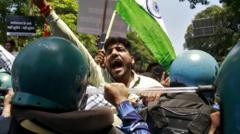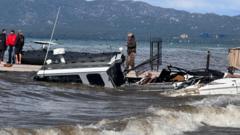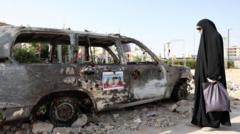In a dramatic response to a tragic attack in Indian-administered Kashmir that left 26 tourists dead, Pakistan has suspended all visas for Indian nationals and taken further diplomatic measures. Islamabad's actions come as they vehemently deny involvement, while India insists on accountability for the attackers.
Tensions Escalate: Pakistan Suspends Visas for Indians Amid Kashmir Attack Fallout

Tensions Escalate: Pakistan Suspends Visas for Indians Amid Kashmir Attack Fallout
Pakistan imposes visa restrictions on India following a deadly militant shooting in Kashmir that took the lives of 26 tourists.
With the recent militant attack in Kashmir resonating deeply, Pakistan has implemented immediate visa suspensions for Indian nationals. The decision follows the harrowing shooting near Pahalgam where gunmen targeted a group of tourists, resulting in significant loss of life. In retaliation to the violence, Pakistani authorities expelled several Indian diplomats and closed airspace for Indian operations.
Indian police have identified three suspects in the attack, alleging ties to the Pakistan-based militant outfit Lashkar-e-Taiba (LeT), a claim that Pakistan categorically dismisses as baseless. The assault has escalated already high tensions between the two nations, with India's Prime Minister Modi declaring intent to track down and punish the terrorists responsible.
In response to the attack, India has initiated its own set of diplomatic measures against Pakistan, closing the Attari-Wagah border and halting visa services for Pakistanis. Pakistan, in turn, has intensified its stance by rejecting India's suspension of the Indus Water Treaty, warning that any threats to their water supply may be perceived as acts of war.
As authorities investigate the brutal attack, which has fueled renewed enmity between the neighboring countries, Kashmir is in a tense state. A curfew had previously been imposed, but most businesses have begun to reopen. The tragic deaths, including those of a naval officer on honeymoon and a guide who supported his family, have sparked national outrage and a collective mourning in India.
Emotions are currently running high with reports emerging of Kashmiri students facing harassment in India, leading to a broader atmosphere of fear and tension in the wake of the attack. As families mourn their loved ones, there are calls for unity and calm amid these upheavals.
Indian police have identified three suspects in the attack, alleging ties to the Pakistan-based militant outfit Lashkar-e-Taiba (LeT), a claim that Pakistan categorically dismisses as baseless. The assault has escalated already high tensions between the two nations, with India's Prime Minister Modi declaring intent to track down and punish the terrorists responsible.
In response to the attack, India has initiated its own set of diplomatic measures against Pakistan, closing the Attari-Wagah border and halting visa services for Pakistanis. Pakistan, in turn, has intensified its stance by rejecting India's suspension of the Indus Water Treaty, warning that any threats to their water supply may be perceived as acts of war.
As authorities investigate the brutal attack, which has fueled renewed enmity between the neighboring countries, Kashmir is in a tense state. A curfew had previously been imposed, but most businesses have begun to reopen. The tragic deaths, including those of a naval officer on honeymoon and a guide who supported his family, have sparked national outrage and a collective mourning in India.
Emotions are currently running high with reports emerging of Kashmiri students facing harassment in India, leading to a broader atmosphere of fear and tension in the wake of the attack. As families mourn their loved ones, there are calls for unity and calm amid these upheavals.





















